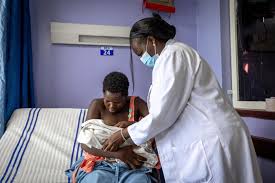Despite the progress made in lowering maternal mortality in Africa since 2000, new estimates by the United Nations Maternal Mortality Estimation Interagency Group has shown that the African region must needs a 12-fold increase in the annual reduction rate to reach the Sustainable Development Goals (SGD) target of fewer than 70 deaths per 100 000 live births by 2030.
Although the region has recorded a 40 per cent decline in maternal mortality, from 727 to 442 deaths per 100 000 live births between 2000 and 2023, the region still accounts for 70 percent of global maternal deaths.
According to the World Health Organisation (WHO), an estimated 178 000 mothers and one million newborns die in the Africa region many from preventable causes every year.
At the current annual reduction rate of 2.2 per cent between 2000 and 2023, the region is projected to have nearly 350 maternal deaths per 100 000 live births by 2030, five times higher than the SDG target of fewer than 70 deaths.
Likewise, although stillbirth and neonatal mortality rates have declined by 30 per cent and 33 per cent respectively between 2000 and 2023, sub-Saharan Africa still accounts for 47 per cent of stillbirths and 46 per cent of global newborn deaths.
The region is projected to record neonatal mortality rate of about twice the SDG target of at least as low as 12 deaths per 1000 live births by 2030.
This year’s World Health Day, marked under the theme “Healthy Beginnings, Hopeful Futures,” calls on governments, donors and communities to ramp up efforts to end preventable maternal and newborn deaths and to prioritize the longer-term health and well-being of women and children.
Acting WHO Regional Director for Africa Chikwe Ihekweazu said: “In too many places, pregnancy and childbirth are still life-threatening events but it doesn’t have to be this way.
“Every dollar invested in maternal and newborn health delivers major returns: healthier families, stronger societies and sustainable economic growth.”
Key barriers to progress include inadequate financing, weak governance, health workforce shortages and recurring shocks, such as disease outbreaks and conflicts, all of which disrupt maternal and child health services. In fragile and crisis-affected settings, women and children are particularly at risk.















